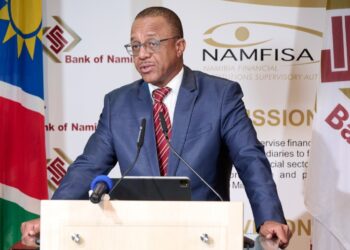
Due to frequent interest rate hikes and increased cost of living, more and more Namibians are finding it difficult to keep up with their loan instalments.
On 14 June 2023 the central bank announced a third consecutive increase in the repo rate – this time by 50 basis points (bps), from 7,25% to 7,75%. Currently, the prime lending rate is 11,50%.
Year to date, the Central Bank hiked the repo rate by 100Â basis points, and they expect inflation to average 6,1% in 2023.
Despite the persistent interest rate hikes, the Bank of Namibia reported a surge in households’ demand for credit, which by the end of June 2023 increased by 5,3% year on year. It is clear that mortgage loans drive credit growth, and people still see a roof over their heads as an investment.
According to the Namibia Statistics Agency (NSA), the country’s inflation slowed to 5,3% in June 2023.
When it becomes difficult to pay off their debt, clients must reach out to the bank and start a conversation before it is too late. Through responsible lending practices, Nedbank Namibia can help clients regain financial stability through alternative options, like debt restructuring or debt consolidation.
What responsible lending entails
For financial institutions like Nedbank, responsible lending involves evaluating a prospective client’s creditworthiness and viability before approving the loan: we assess their income, expenses and credit history to make sure, as far as we can, that they are not taking on more debt than they can manage.
Existing and prospective clients have a moral obligation to consider borrowing only when they need to, and they must still be able to settle their debt despite interest rate hikes and the rising cost of living.
Furthermore, clients must clearly understand the terms and conditions of a loan. This includes the interest rates, fees and repayment terms, as well their duties and commitments, like paying on time.
Responsible lending helps maintain the stability of the financial system.
Responsible lending practices support confidence in Namibia’s financial system, which encourages foreign investment and economic growth; investors are more willing to invest their money into a country’s financial system if it is well managed and controlled. We believe that responsible lending is crucial for the long-term viability of the bank and its clients, which is how we ‘see money differently’.
All financial institutions in Namibia must comply with the Financial Institutions and Markets Act (FIMA), which was passed in 2021. Under this law the Namibia Financial Institutions Supervisory Authority (NAMFISA) plays the role of referee to ensure that entities follow responsible lending principles. NAMFISA also regulates responsible lending practices to make sure that banks abide by the responsible-lending guidelines outlined in FIMA.
Nedbank has also created internal policies and procedures to comply with FIMA requirements.
Maintaining responsible lending practices can support long-term economic growth:
- It reduces the risk of default.
- It safeguards long-term financial health by upholding ethical lending standards and creating a stable base of borrowers who can afford to repay their loans.
- Borrowers are more inclined to take out loans if they are confident in their ability to repay the loan, which promotes increased economic activity and growth.
Careless lending practices, like authorising mortgages without doing adequate affordability evaluations, cause a high rate of subprime mortgage defaults. During the 2008 global financial crisis, reckless lending and borrowing behaviours by financial institutions – particularly in the United States mortgage bond market – caused a collapse in the housing market that, in turn, caused the financial system to collapse.
Financial institutions’ subsequent packaging and sale of these subprime mortgages as mortgage-backed securities to investors everywhere affected the world’s financial system negatively.
Although we have not had a significant financial crisis in Namibia so far, our responsible lending practices have been essential in maintaining Namibia’s financial stability and safeguarding borrowers from excessive debt.
Market Conduct Policy
At Nedbank, the Nedbank Market Conduct Policy plays a critical role in encouraging responsible lending practices. It specifies the values and procedures that we uphold when we provide financial services. It also helps us ensure that we act morally, openly and in the best interests of our clients.
The policy places a strong emphasis on encouraging responsible lending practices by making sure that our clients receive fair treatment and clear information about the loans. This includes disclosing specifics on interest rates, costs and penalties for when they don’t pay in time.
The policy also helps employees to make sure that we abide by industry norms of conduct and legal obligations.
Nedbank’s commitment to responsible lending and how these practices protect both clients and banks.
Nedbank is committed to responsible lending and has taken several steps to ensure that it abides by these guiding principles. We developed an affordability calculator that determines a client’s ability to repay the loan by considering their total income, total expenses and credit history.Â
Through this calculator, we can make sure that our clients do not take on more debt than they can afford. It also helps us to lower the danger of default and safeguards our clients from excessive debt and financial hardship.
* Erastus Haihambo is the Head of Personal Loans at Nedbank Namibia











